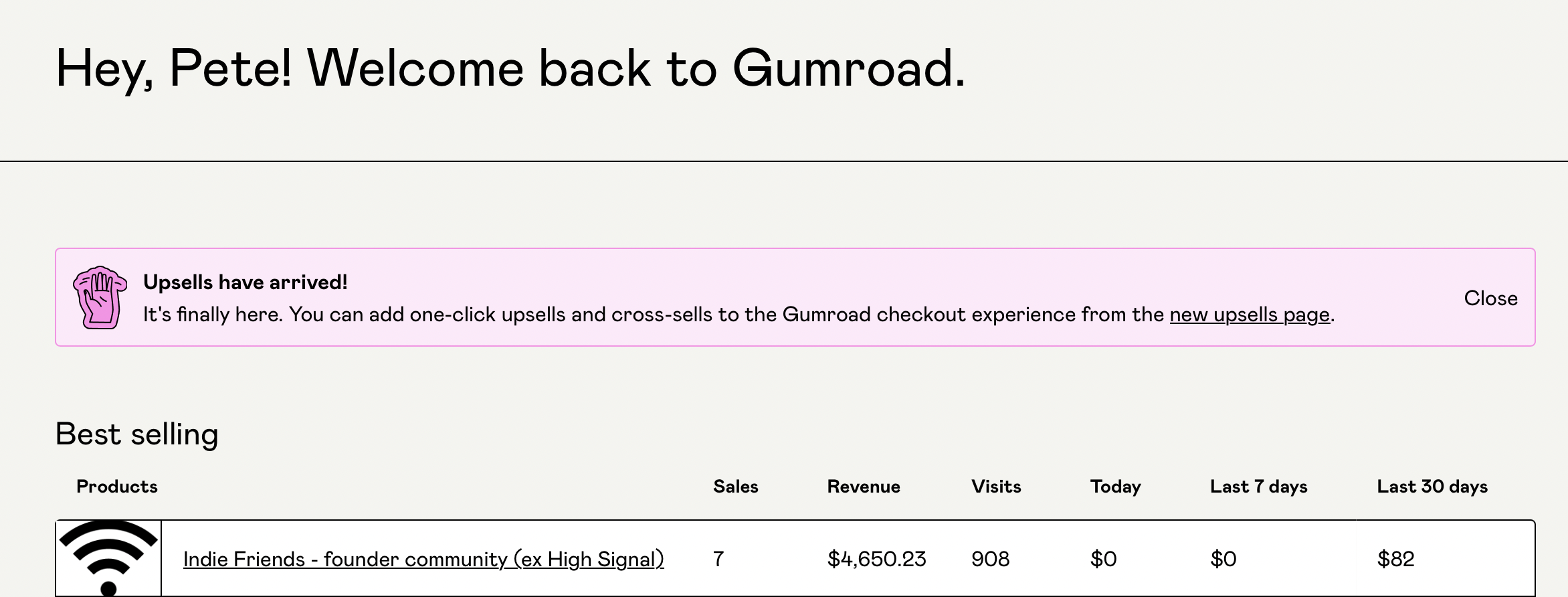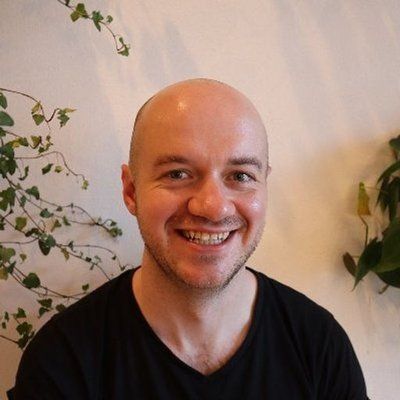I'm shutting down my founder community

A lot of people say building paid communities is hard and they are right. I have taken the very difficult decision to close my founder community, Indie Friends, to new members.
It will remain as a free group for current members but it will be invite-only. I won't be making any more money from it and I've taken down the Gumroad page. Hopefully, this write up will be helpful reading.

The idea
I wanted to create a group for founders based on getting to know each other and not just spamming links. I also wanted a group with a requirement that you had to have a certain amount of revenue before you could join.
The idea was this would mean there would not be spamming as people wouldn't use it as a marketing channel if they had revenue already. Also, it would mean I was getting advice from experts and not armchair experts or wantrepreneurs.
I wanted to have real conversations with people so an important part of the group was having weekly calls on Zoom. This worked pretty well at first. I got a small group of friendly people based on this idea but I was unable to grow the group beyond a small number of founders.
How much revenue I made
In about 10 months I made $4,650.23 from Gumroad plus a few early Stripe payments. I've refunded all the recent payments for May and cancelled all the other annual payments. It was priced at varying points but for most of the time it was $19/m for access to the Telegram group and $39/m with Zoom calls as well.

Beginnings and successes
I got some initial traction by increasing the membership price by $1 for each new person that joined. This worked a lot better than starting with a free group as it created urgency and an incentive for people to join. People who had been on the fence started to join when there was this FOMO factor.
I had a strong launch on Product Hunt and on Twitter and I was sure that I would hit $1,000 MRR after 5 months. After a couple of months of new people joining though it plateaued revenue-wise.
It's tempting as humans to view everything in a very black and white way. It wasn't a total failure though. I made some great friendships and got lots of very valuable advice from some smart founders.
There have been a lot of times where talking to them has reminded me that behind the scnes, not everyone is crushing it. Lots of founders have stress or are putting out fires when things break. So I would recommend either joining a private community of some kind or just sending DMs to other founders.
On the more positive side of things, there are people in the group who are making lots of money. For instance, I was pleased to chat to Tom about selling Tweet Hunter for millions, for example:
The group was helpful for lots of members and I'm glad some of them have been arranging calls with each other to help each other out with their businesses! The good vibe with the other founders is why I decided to maintain the group and not close it down altogether. I'm sure we will still have calls now and again, they just won't be on a regular schedule where I have to be there every week.
Why I'm closing it
After almost two years of working on the community, it simply doesn't make enough money to justify working on it. I can make more from a few months of ghost writing on Twitter with one client than a year of the community.
Then you compare this with gaining a new community member bringing in $39. When you look at it like that, it shows how hard it is for B2C businesses to work. You need an awful lot of customers with B2C. Hats off to anyone who can run a paid community and make decent revenue! There is also the fact that some members have left or were thinking of leaving and I realised the momentum had gone away a long time ago.
Sunk cost fallacy
I did consider that maybe I could keep working on it but I realised that is the sunk cost fallacy at work. This is when you keep on doing something just because you've put a lot of time, money or effort into it. I think almost two years is more than enough time to give a project to make money.
I was also inspired by how Pat Walls decided to ditch his SaaS, Pigeon, and focus on Starter Story after he realised that was the better business:
"The mistake: I’m not focusing on the business opportunity that is clearly working - Starter Story. Years ago (before Starter Story), my dream was to build a SaaS business - which is what attracted me to building this new product Pigeon over the last year. But the writing is on the wall - Starter Story is the better business. I’ve realized it’s where I need to put all of my energy. Over the last year, I’ve been splitting my time across both projects, putting crazy hard work into Pigeon and seeing menial results, and putting in less mindshare into Starter Story yet seeing really great results!"
That was in May 2020 when he was making $9k a month. Three years later to the month and he is now making $100k a month!
Why did it fail?
I think there are many reasons, but here are some:
Communities are hard
Community are deceptively easy - get a group of 100 people with a common interest, get them to pay $10 a month and you have $1,000 already! Get 1,000 people to sign up and that's $10k MRR. If it was easy, eveyone would do it. Except that everyone wants something different from a community!
Take organising a running club as an example. Some people will want to run super-fast, some will want to run at a sociable pace as a group, while others will want to run at a slower pace on their own and not talk to anyone.
Maybe some of the runners want to run at the weekend but others weekdays. Some runners like running first thing in the morning but others prefer evenings. If you can agree on a day and a time of the week you then have to choose a venue.
Finally, you have to make sure the right people join and are happy with the rest of the members. In short, there are a huge number of variables when organising communities and it's hard to please everyone.
Too small a market
By requiring community members to have revenue, that was drastically cutting down the number of potential customers.
As one founder Chris McCormick once wrote on the Indie Hackers community forum, most people aren't making much, if any, revenue because entrepreneurship, particularly without VC funding, is hard.
Check his full post "holy heck this is hard"
Here is an excerpt from it:
Wait a second. Am I looking at this right? There are only 12 products that are making more than $10k MRR on that list. That's 12 solo founders, out of the 17,207 people who have joined Indie Hackers since its inception. Wow.
Just 193 products are making more than $2k self-reported MRR. Insane. That's like 1% of the Indie Hackers audience. We got our own one percent club over here. 😂
By requiring people to have revenue to join, I also drastically reduced the potential size of my market.
If only 1% of the indie founder market has $2k/m, then that's a tiny market to try to sell to even if my revenue requirement was lower at $500/m. It's still a tiny number of people.
- Then imagine that I'm obviously not going to convert every potential customer anyway.
- Then add the fact that many founders don't like Telegram and prefer Discord or Slack. Or just don't want to pay for a community.
- Also, as I'm based in the UK our calls were really only suitable for founders in Europe, Africa or Asia so that cut off the whole of the Americas as a market.
So in summary I was looking for bootstrappers with profitable businesses, who were based outside of the Americas, who like Telegram and want to do Zoom calls 😅
You can see that I was therefore fishing in an extremely small pond.
Don't sell to indie hackers
One of my friends is making $14k profit a month and won't pay $10 a month for Zoom, haha! Most indie founders are pretty cheap, myself included. So it is always going to be challenging asking them to pay to join a paid community when there are free alternatives like other Telegram groups, Slack groups, Twitter, Reddit, Indie Hackers etc.
No geographic basis for the community
I think other communities created in huge cities definitely have an advantage. My local startup scene in Edinburgh is tiny, especially for indie founders. If you can start a group seeded with founders from a big city, then you have a big advantage over someone purely meeting people online. It is what it is.
Poor design
I'll put my hands up and admit that I didn't put enough effort into polishing the landing pages or the product page on Gumroad. Having a screengrab of people on Zoom as the cover image on Gumroad probably wasn't going to cut it. There are some impressive members in the group so I could have done a better job of showing off their achievements to entice people to join.
People want in-person meetups
Another possible reason is that since the pandemic has thankfully receeded, people want to get back to in-person meetups. So it could be there is less appetite to joining another Zoom call compared to when I started the group in July 2021. I totally get that! I've enjoyed meeting some founders in Edinburgh where I live, including some Indie Friends members like Val and Phil.
Great time meeting founders and my old Aussie friend Ric yesterday 🎉
— Pete - ghost writer for hire (@petecodes) March 26, 2023
We talked a lot about AI 🤖😂 pic.twitter.com/8gWqtIanLL
Bad name
I love the High Signal name and I think it works great for my founder newsletter. But as one of my community members pointed out, our community is a very chill, friendly place to un-wind. Also, having 'indie' or 'friends' in the name would have been smarter so it was clearer from the name what the product was about. So a name like Indie Friends would have been better from the start, perhaps.
A more positive view from failure
A US founder friend just sent me this after I told him I was mothballing the group.
"Hey Pete! Oh cool, sounds like you're focusing on other things then? (Monetization wise)"
I think that's a good way to look at it! It's sad to shut down a project but it's good to be able to put my time and energy into something that works better. It's a very positive trait of Americans to look on the up-side. As cheesy as it sounds, you usually have to have a lot of fails on the path to success.
Check out this list of failed startup ideas from other indie founders
Lessons
- Don't make a paid community
- Sell to businesses instead of individuals
- Go for a sizeable market
- Double down on what's working
- Fail fast
What next?
With the extra time and mental bandwith, I'll be focussing on building the High Signal newsletter subscriber base and ad revenue as well as working on my Twitter ghost writing service. I'll still be posting in the telegram group and jumping on the odd call every few weeks when I feel the urge.
Thanks to everyone who was or is a member of the group - it's been a blast!
I made this into a Twitter thread here:
A lot of founders say building paid communities is hard 😩
— Pete - ghost writer for hire (@petecodes) May 12, 2023
I have taken the difficult decision to close my founder community, Indie Friends, to new members.
It will remain as a free group for current people but it will be invite-only
Hope this write up will be helpful: pic.twitter.com/CC1MICRYF5
